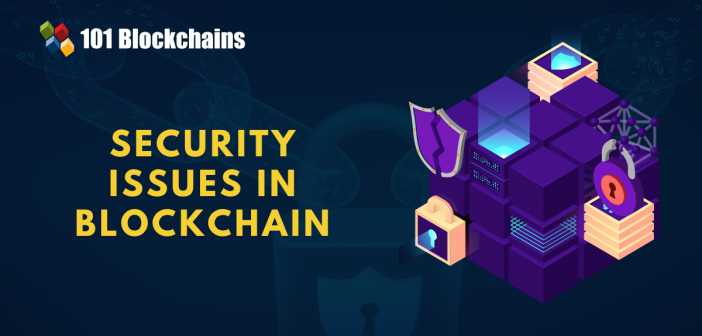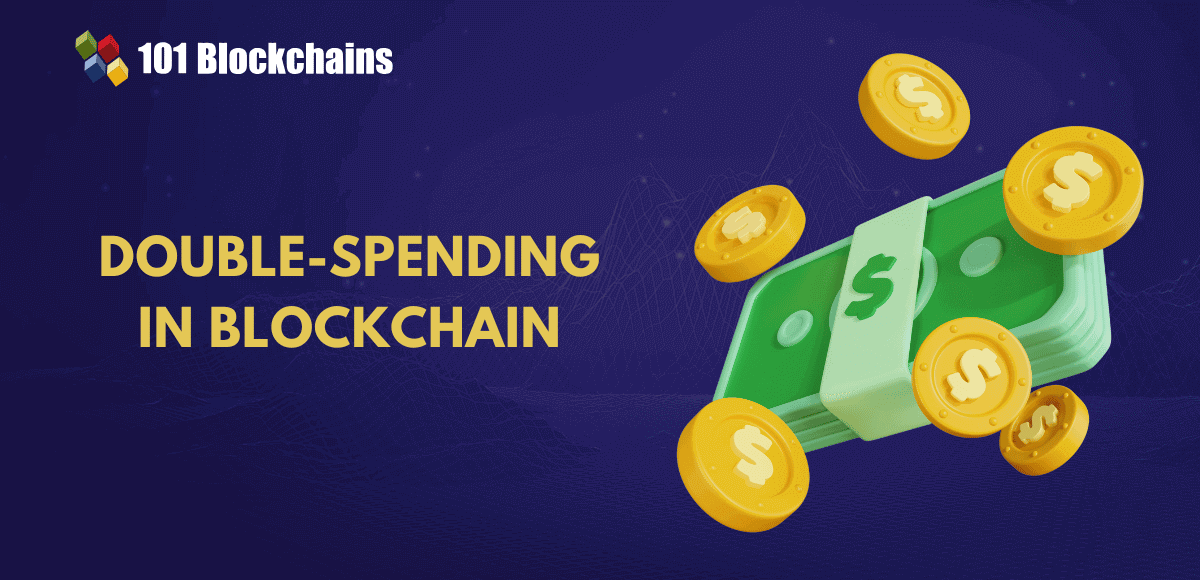Learn how blockchain truly works, master key definitions, and uncover what makes smart contracts so "smart." Dive into the fundamentals, gain valuable insights, and start your blockchain journey today!

Blockchain
James Howell
on January 28, 2025
Top 5 Blockchain Security Issues in 2025
Blockchain technology undoubtedly has many benefits, especially cryptographic security. However, it also has several issues. Let’s discuss the top blockchain security issues!
Blockchain technology has been a prominent example of transforming the tenets of security in financial transactions and information exchange. It offers a unique structure for data accompanied by in-built security qualities. Blockchain relies on the principles of consensus, decentralization, and cryptography for ensuing trust in transactions. However, blockchain security issues have continued to trouble many organizations and early adopters.
Even well-established blockchain startups experience troubles in blockchain security. Furthermore, many unwanted risks keep emerging in the field of blockchain security and create a prominent question – ‘Is Blockchain really secure?’ with formidable doubt regarding security on the blockchain. The following discussion aims to dive into a detailed overview of the various issues pertaining to blockchain security.
Blockchain is Essential Now More Than Ever
The world wants to dive headfirst into the next wave of digital transformation, especially with blockchain technology. Blockchain has been able to attract attention from all corners for its unique functionalities. It is suitable for different use cases. As a matter of fact, it has turned into a credible approach for introducing better security and transparency in technology solutions. In order to have blockchain security explained properly, you need to get a brief understanding of what blockchain is.
Blockchain technology basically involves the storage of different bits of digital information, known as blocks, in a public database. The blocks of information have cryptographically secure links between them. Blockchain has become popular largely because of the limitation on ‘double spending.’ Blockchain does not allow the use of the same currency on two different transactions.
Now, let us take a brief overview of the components in blockchain before finding out blockchain security vulnerabilities. The blocks include three fundamental information pieces such as,
- Transactional information, including the date, amount, and time of purchase
- Unique algorithmic hash or code for differentiating one block from others
- Identities of every party associated with the transaction
It is possible to add new blocks subsequently to a blockchain for new transactions. The block receives a unique identifying code after the validation of a new transaction.
Build your identity as a certified blockchain expert with 101 Blockchains’ Blockchain Certifications designed to provide enhanced career prospects.
How Does Blockchain Work?
The next important concern in the study of blockchain security issues refers to the working of blockchain. The primary foundation in the working of blockchain is decentralization. Distributed ledger technology enables structuring data into blocks, with each block including one transaction or multiple transactions. New blocks connect to other previous blocks in a cryptographic chain. Most important of all, it is difficult to tamper with the chain of records or any individual record, i.e., block. So, this is a clear indication of reliable levels of blockchain security.
All the transactions in the blocks have to be validated and verified through a consensus mechanism. Therefore, a consensus mechanism can ensure that all transactions and true and correct. So, it is quite clear that blockchain definitely offers assurance for the integrity of transactions and associated information.
If you are still wondering, ‘is blockchain really secure?’ then you must also take a look at decentralization. Blockchain helps in achieving decentralization through the involvement of members throughout a distributed network. Interestingly, the decentralization with blockchain ensures the lack of a single point of failure. Therefore, any specific user could not change the whole record of transactions.
Get familiar with the terms related to blockchain with Blockchain Basics Flashcards.
Difference in Blockchain Security According to Blockchain Type
The difference in blockchain security for public and private blockchain is also another highlight of blockchain security explained properly. Blockchain networks can have different implications regarding the privileges for participation and data access. Therefore, you can find two different types of labeling for blockchain networks. Depending on the privileges for participation, blockchain networks can be private or public. On the other hand, the methods for participants to gain access to the network determine whether the blockchain network is permissioned or permissionless.
- Public blockchain networks are open and could allow any user to join while ensuring the anonymity of participants. Public blockchain leverages internet-connected computers for validating transactions alongside achieving consensus.
- Private blockchain networks depend on identity for confirming membership and access privileges. In addition, they allow the participation of only the familiar organizations.
The understanding of security concerns with different types of blockchain networks promotes better scope for learning about blockchain security issues. The evaluation of type of blockchain network suited to your business goals can help in making a better selection. For example, private and permissioned networks could have tighter controls for regulatory and compliance concerns. On the contrary, public and permissionless networks can enable better distribution and decentralization.
Is Blockchain Really Secure?
All descriptions of blockchain technology point out towards cryptography, immutability, and decentralization. With cryptographic security and the assurance that no one can modify data without the knowledge of other participants, blockchain definitely seems secure. Blockchain can give you a tamper-proof account of transactions.
However, this does not mean that blockchain is not vulnerable to cyber-attacks and security fraud. People with malicious intent could exploit the blockchain security vulnerabilities to their advantage. Many such examples of blockchain attacks have made news from time to time. Here are some of the notable incidents which expose the most troublesome aspect of blockchain.
-
A Case of Missing Keys
The theft of customers’ Bitcoins from Hong Kong-based cryptocurrency exchange, Bitfinex shows that blockchain is not so secure after all. The estimated cost of Bitcoins was around $73 million. Experts pointed out that stolen private keys or personal digital signatures were the most probable cause for the event.
-
Exploited Code
The next notable event showcasing security and privacy issues of blockchain technology refers to the Decentralized Autonomous Organization (DAO). It is a venture capital fund that works on the foundation of a decentralized blockchain. Interestingly, many consider DAO to be inspired by Bitcoin.
All the names and still hackers robbed the fund in an amount exceeding $60 million of Ether. The blow was quite hard for DAO, as it accounted for almost one-third of its total value. Code exploitation served as the primary culprit for this event and rightfully showed the vulnerability of blockchain.
-
Hacking Employee System
Another example of blockchain security issues is Bithumb. It is also one of the biggest cryptocurrency exchanges for Bitcoin and Ethereum. Hackers were able to dig into data of around 30,000 users alongside stealing Bitcoin worth $870,000. Interestingly, the core servers were intact, and a compromised employee computer was the primary culprit. However, it does not negate the fact that blockchain technology has some pitfalls in security.
Based on all these aspects, we can definitely establish that blockchain isn’t so secure after all. Therefore, it is important to understand every detail that influences blockchain security. So, let us take a look at some of the top blockchain security vulnerabilities in 2025.
Want to build carrier in blockchain technology? Enroll in our Entrprise Blockchain Fundamentals Course
Notable Blockchain Security Issues in 2025
Many people are not mistaken when they assume blockchain is inherently secure. However, blockchain also has some drawbacks when it comes to security. Blockchain is definitely helpful for businesses, although with a heavier downside due to its particular security issues. Without taking any further time, let us go through some of the top threats to blockchain security in 2025.
1. 51% Attacks
Computing power is quite crucial for gaining majority control over the hashrate of a blockchain through malicious entities. Therefore, compromised blockchains could result in the reversal of transactions alongside double-spending. In 2018, three renowned cryptocurrency platforms experienced issues from 51% attacks. The three platforms were Ethereum Classic, ZenCash, and Verge. Furthermore, enterprises lost around $20 million dollar annually in recent times due to 51% attacks.
If you have to avoid blockchain security issues due to 51% attacks, then you have to be careful about certain measures. For example, you can improve monitoring of mining pools and ensure a higher hash rate alongside refraining from the use of Proof-of-Work (PoW) consensus mechanisms.
2. Blockchain Endpoint Vulnerabilities
Another notable instance of security risks in blockchain security explained properly refers to the vulnerability of blockchain endpoints. The security of the blockchain is the talk of the town. However, no one cares to address the concerns in the security of endpoints for blockchain transactions. For example, Bitcoin investment or trading could result in a large amount of Bitcoin stored in a virtual savings account.
The actual blocks are safe against hackers. On the other hand, the wallet accounts are not safe. Furthermore, many third-party vendors are also important for facilitating blockchain transactions. Some of these third-party vendors include blockchain payment platforms, payment processors, and smart contracts. Such types of third-party blockchain vendors can increase vulnerability to hacking due to weaker security in apps and websites.
3. Routing Attacks
The next prominent concern for security and privacy issues of blockchain technology refers to routing attacks. Blockchain networks and applications depend on the massive volume of data transfer in real-time. Now, hackers could easily intercept data during the course of its transmission to internet service providers. The dangerous aspect of routing attacks in blockchain security lies in their anonymity.
The blockchain participants could not find out the threat of routing attacks easily as everything appears normal. Routing attacks are generally employed for leaking out confidential data or extracting monetary benefits without alarming network participants. Therefore, it is quite clear that routing attacks can be detrimental as they could impose considerable damage before detection.
4. Phishing Attacks
If you are wondering, ‘Is blockchain really secure?’ then you need to think of phishing attacks. Phishing is one of the most common baiting techniques used by hackers. It is basically a scamming attempt to obtain the credentials of a user. Hackers send emails to wallet key owners by posing as an authentic, authoritative source.
Such types of emails request information about user credentials through fake hyperlinks. When hackers can access the credentials and sensitive information of a user, the users, as well as the blockchain network, are open to subsequent attacks. The growing number of phishing attacks in blockchain networks has created profound levels of concern in recent times.
5. Transaction Privacy Leakage
Another formidable addition to blockchain security vulnerabilities in 2025 is transaction privacy leakage. User behaviors are traceable on blockchain networks. Therefore, blockchain systems must safeguard transaction privacy for users. Basically, users must assign a private key for every transaction.
As a result, hackers could not determine if a single user is receiving cryptocurrency in different transactions. On the contrary, privacy protection in blockchain has not developed completely. Research shows that around 66% of sampled transactions do not have any chaff coins or mixins. Chaff coins or mixins can restrict the abilities of hackers to determine the association between coins spent in the transaction.
Start learning Blockchain with World’s first Blockchain Career Paths with quality resources tailored by industry experts Now!
Final Verdict
A clear overview of the different blockchain security issues shows the complicacy in the existing state of blockchain security. The awareness of vulnerabilities in blockchain security is essential to create better networks and systems. Furthermore, technical advancements such as AI-based solutions for infrastructure, transaction, and code analysis can spell new trends in blockchain security.
If you want to develop a better understanding of blockchain security, then you can look for 101 Blockchains CBSE certification. The Certified Blockchain Security Expert certification gives you the ideal platform for validating your skills in enterprise blockchain security. Take a deep dive into blockchain cryptography fundamentals, consensus algorithm security, smart contract security, and many other topics. Start gaining expertise in blockchain security to become a Certified Blockchain Security Expert!
*Disclaimer: The article should not be taken as, and is not intended to provide any investment advice. Claims made in this article do not constitute investment advice and should not be taken as such. 101 Blockchains shall not be responsible for any loss sustained by any person who relies on this article. Do your own research!






